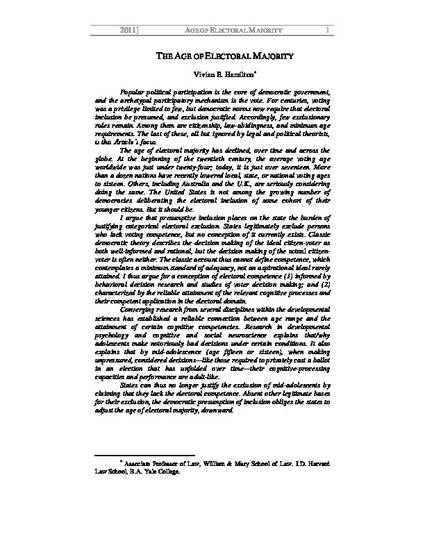
Unpublished Paper
The Age of Electoral Majority
ExpressO
(2011)
Abstract
Popular political participation is the core of democratic government, and the archetypal participatory mechanism is the vote. For centuries, voting was a privilege limited to few, but democratic norms now require that electoral inclusion be presumed, and exclusion justified. Accordingly, few exclusionary rules remain. Among them are citizenship, law-abidingness, and minimum age requirements. The last of these, all but ignored by legal and political theorists, is this Article’s focus. The age of electoral majority has declined, over time and across the globe. At the beginning of the twentieth century, the average voting age worldwide was just under twenty-four; today, it is just over seventeen. More than a dozen nations have recently lowered local, state, or national voting ages to sixteen. Others, including Australia and the U.K., are seriously considering doing the same. The United States is not among the growing number of democracies deliberating the electoral inclusion of some cohort of their younger citizens. But it should be. I argue that presumptive inclusion places on the state the burden of justifying categorical electoral exclusion. States legitimately exclude persons who lack voting competence, but no conception of it currently exists. Classic democratic theory describes the decision making of the ideal citizen-voter as both well-informed and rational, but the decision making of the actual citizen-voter is often neither. The classic account thus cannot define competence, which contemplates a minimum standard of adequacy, not an aspirational ideal rarely attained. I thus argue for a conception of electoral competence (1) informed by behavioral decision research and studies of voter decision making; and (2) characterized by the reliable attainment of the relevant cognitive processes and their competent application in the electoral domain. Converging research from several disciplines within the developmental sciences has established a reliable connection between age range and the attainment of certain cognitive competencies. Research in developmental psychology and cognitive and social neuroscience explains that/why adolescents make notoriously bad decisions under certain conditions. It also explains that by mid-adolescence (age fifteen or sixteen), when making unpressured, considered decisions—like those required to privately cast a ballot in an election that has unfolded over time—their cognitive-processing capacities and performance are adult-like. States can thus no longer justify the exclusion of mid-adolescents by claiming that they lack the electoral competence. Absent other legitimate bases for their exclusion, the democratic presumption of inclusion obliges the states to adjust the age of electoral majority, downward.
Keywords
- Voting,
- democracy theory,
- adolescents' rights,
- cognitive development,
- developmental psychology,
- neuroscience,
- behavioral decision theory
Disciplines
Publication Date
February 14, 2011
Citation Information
Vivian E. Hamilton. "The Age of Electoral Majority" ExpressO (2011) Available at: http://works.bepress.com/vivian_hamilton/3/
